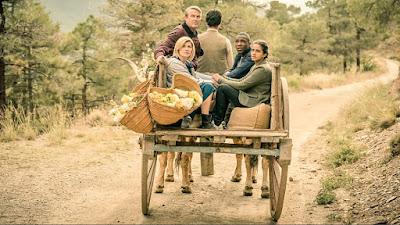Doctor Who: 'Demons of the Punjab' review
Whittaker's series has it's first emotionally deep and morally complex storyline, in the form of 1947 Pakistan in which the aliens are the heroes and we are the demons
 |
| Team TARDIS in Pakistan: 'Demons of the Punjab' (BBC) |
by Jack Linsdell
Whittaker's debut series as the iconic timelord, known across the world as Doctor Who, has passed it's half-way point with 'Demons of the Punjab', the sixth episode. And, what an episode it was.
I've argued ever since the series opener 'The Woman Who Fell to Earth', that the Thirteenth Doctor has taken the show back to its basic format (three companions to the Doctor, simplistic storylines, original villains/monsters etc.), which has provided a refreshing change to the Moffatt and Smith/Capaldi era that had defined the show these past few years. And, this episode continues to be refreshingly unique but also strives to tap into the depth and complexity from Whittaker's predecessor.
As I've noted every week, this was the first episode in the series not to have the writing involvement of new showrunner and executive producer, Chris Chibnall. He's written all five episodes so far, helping to establish a new Doctor and her new 'team', as well as providing us some excellent sci-fi, Sunday night escapism stories. His narratives have scaled back the grandeur and world domination themes of Moffat's era, giving us more simplistic (but no less well-written, coherent) storylines, giving us a focus on characterisation. Despite the unfair criticism and media backlash he's undergone, I think he did an excellent job at kicking of this series. But, the point of relevance is that it was always going to be a test this week of where the series stands (quality wise) when he isn't involved in the story process.
This episode was written by relative television writing newcomer of British-Indian ethnicity, Vinay Patel, and the conclusion that can be drawn here is that the series will be in safe hands. Firstly, Patel keeps with the style and format Chibnall has established. Indeed, the storyline here is simplistic and engaging to all. It's also unique. The setting of 1947 Pakistan gives us yet another new historical episode, yet one that the series (or quite frankly any film or TV show) hasn't really explored/depicted. The whole basis of the Partition of 1947 and the establishment of borders between Pakistan and India, resulting in high levels of murder and civil unrest is an event hardly any British people will know anything about, and to depict an important moment in our history (we helped cause the whole thing) is something that gains the series a lot of respect. The way Patel also uses the backdrop to explore Yaz's family history and the reasons surrounding her Grandmothers life as a young woman is expertly done and provides the episode with some of its most compelling material.
Originality wise, 'Demons of the Punjab' is an ironic title. Like probably everyone else, I expected to witness a story about aliens plaguing Pakistan and its people. However, the aliens (in this case "the universe's deadliest assassins) are the heroic ones and the demons are actually the human race itself. The assassins are actually preserving human souls that die alone, confused or in unfortunate events after their own race were all killed without warning. And, this gives the episode a nice, half-way twist and actually means the Doctor battling the human race as the monster this time. Maximum points scored for originality.
However, this episode is notably different from Chibnall's in the extent that it is much more emotionally deep and morally complex than any other story in series 11 so far, and this could hint to the series essentially being half "purely simplistic sci-fi escapism" and the other half "morally and emotionally though provoking drama". Of course, until the series has run its course we won't know for sure. But, this complexity is something I've been waiting for and it shows us that Whittaker's Doctor has these types of stories in her. Indeed, the Doctor and her team have to (spoilers!), knowingly let Yaz's Grandmother's husband die in order to not affect the timelines. The Doctor herself goes from wanting to spend the least amount of time in 1947 Pakistan, to wanting to save everyone. Yaz goes from not wanting her Grandmother to marry her current husband, to being distraught when he ends up dying. The point being is that there is so much morality and emotional material in the episode to unpick that it has a re-watchable quality to it and elevates the series beyond the "sci-fi Sunday night escapism" that we all thought it was 'just' going for. It's truly a human story - which is where Capaldi's era was at it's best.
As a slight digression, re-watching Capaldi's series 10 finale and his last episode, the Christmas special 'Twice Upon a Time' brought me to tears of numerous occasions in a way hardly any form of film or TV has before. So, the fact that this episode started tapping into similarly affecting (not to that extent, but you see the point I'm making) material is something to celebrate.
I have to admit that the direction here by Jamie Childs was superb, with a fantastic knowledge of how is camera is moving and where actors are being framed really adding to the intrigue, suspense and emotional depth of the drama being told here. Framing two actors in the same shot and then changing the depth of field when the other speaks (bringing them in and out of focus to put it in simple terms) means we aren't being cut between numerous shots and brought the episode a coherence and sophistication that worked well. Feeding into this, the cinematography of India (I'm not sure if they shot there, but either way it's beautiful) gives the franchise a unique feel as this is a type of setting and terrain the Doctor hasn't really visited before.
Performance wise, Whittaker is still on top form. Her energy has remained consistent throughout the series and if anything, her integrity and emotional depth has grown with each episode. Here, the more morally complex story allows her timelords incarnation to have more to deal with than just good vs. evil. She has to straddle to tricky morality surrounding human beings, specifically race, gender and nationality and its great to see the Doctor challenged this way. The humour, especially that given to Walsh's Graham is some of the best in the series so far and provides another level of entertainment. Gill's Yaz has yet more of her background being explored and the episode is solely based around her personal journey for understanding. Ryan again feels part of the team and as a group the dynamic between the actors is some of the series best also.
In short, 'Demons of the Punjab' is yet another well-written, strongly-acted and fantastically entertaining (humour, emotion and suspense) episode of sci-fi escapism. However, it is also deeply emotionally and morally thought provoking, depicting issues, historical events and settings not familiar to the traditional UK TV audience and feeling therefore original but more compelling than where the series has taken us so far. Indeed, seeing the humans as the real demons is truly well thought out and this proves that the series can expand upon that "accessible for all sci-fi escapism" presentation that it has so far had.
Truly, a stunning piece of British drama. I look forward to next week.
5/5 STARS


Comments
Post a Comment